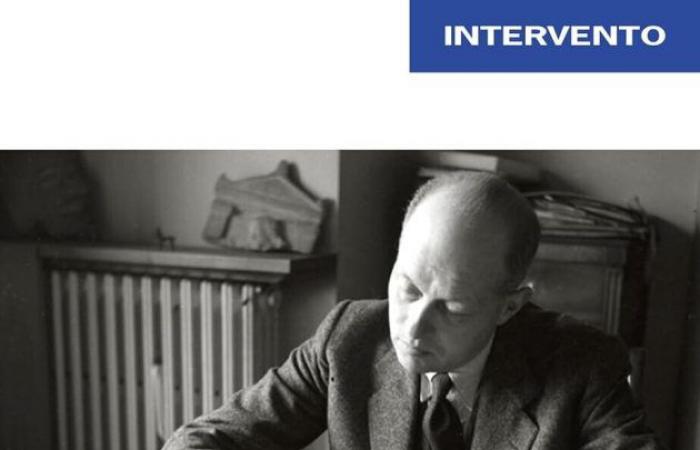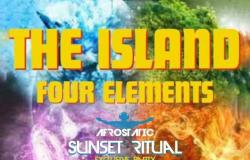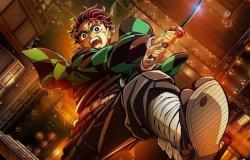Luigi Copertino is an established essayist, a popular columnist and an intellectual with a vast culture. His last essay Drieu la Rochelle. Socialism, Fascism, Totalitarianismpublished by Solfanelli, is part of the “Intervento” series of the Abruzzo publishing house. A term – intervention – that is definitely appropriate for the pamphlet by Copertino, capable of shedding new light on an author who is as refined as he is outside the box.
The Author undertakes the difficult adventure of maintaining a balance between an accurate analysis of La Rochelle’s main works and their transposition into current everyday life.
It is persistent, throughout the work, a Red string which unites that lethal feeling of non-belonging of that “anarcho-fascist-communist” Drieu and the reader who, despite himself, lives in postmodernity, precisely because, as Copertino recalls in the introduction, “Drieu La Rochelle was a restless witness of the modern decadence of Europe and believed that political totalitarianism, red and/or black, could reopen the path to the recovery of Tradition, however not in the impossible return to the pre-modern but rather by crossing the nihilistic desert of modernity to overcome it and rediscover the Spirit in end of the crossing into the desolate western lands of nowhere.”
In these lucid words we find the condensation of the work of Ours, in fact, terms that have an incontestably metatemporal value will be used. With a certain ease the Author, following the work of La Rochelle, integrates insights into the metahistorical and metapolitical significance of the concept of Tradition, holding tightly to himself, almost as if it were a traveling companion destined perhaps to abandon us at the end of this cursed night, decadence, that slope to which history, through its unknown and karst movements, has led the current postmodern, through a series of manifest but also illusory upheavals, esoteric and exoteric, Gnostic upheavals and Enlightened glimpses. If we think about it, we could start using a capital “d” when we bring up Decadence, precisely because only by knowing the qualitative significance of evil can we become aware of the quantitative necessity of good.
In the pamphlet we cannot fail to mention Europe, that common home with millenary origins, whose foundations, at the time of Drieu’s pen, were visibly beginning to creak and not exclusively, as one might think, because of a possible New European Order of German origin, a system which, to the detriment of contemporary ordoliberal derivations, finds in its contemporary and potentially fatal latency the real cause of the non-existence on the heated international chessboard of Europe itself, defined, very acutely, by the historian Franco Cardini as “an economic giant and a geopolitical dwarf”. And on the subject of the Decadence of the European, clearly visible, through recently published data, in the absolute indifference with respect to the possible defense of one’s own Homeland, provided that one is aware of the same term, it is La Rochelle himself, in an extract that appeared in 1940 on The sheaf and providentially cited by Camilla Scarpa, owner of the publishing house Aspis Editions which La Rochelle has already published Roman Intermezzo: “We didn’t help ourselves at all, in May-June, not at all. Because we had too much of a perception of comfort. A people who have only a sense of comfort are not prepared for anything that is life, real life. It wasn’t our teachers, nor our professors, who could teach us what life was. They spoke to us of progress, of perpetual peace, of definitive comfort for all humanity. But life on this planet is not like that: there are earthquakes, storms, cyclones, tempests, fires, epidemics, social and marital difficulties, etc. Life certainly can’t be calm and comfortable from birth to death – otherwise it would resemble death…”
But it is also nihilism, with respect to whose active or passive gradation we maintain a precautionary distance, another prestigious traveling companion, because it is on the meaning of existence that in the end the path of man splits, on whose path, from religious to fluidify the current dystopia in force, we discuss, more or less amicably. Decadence and nihilism therefore run side by side and in relation to these companions of dissolution hovers one of the most insidious and slippery terms ever, that of freedom that Drieu in Fascist socialism declines in a libertarian key: “Freedom is exhausted, man must reinvigorate himself in his darkest depths. It is I who say it – I, the intellectual, the eternal libertarian”.
The rejection of the inevitability of nihilism is one of the aspects to keep in mind when reading Copertino, precisely because of his solid Catholic faith which, despite an apparently discouraging fresco, whose tones are borrowed from the varied and often – perhaps for the distracted or perhaps for the human complexity itself – contradictory Rochellian work and transposed onto the present day, the glimpse that Copertino allows us to glimpse simultaneously preserves the veins of the tragic and the serenity of they will not prevail.
At the same time, Drieu’s anxieties before and during the conflict, at the sight of the finis Europe, have similar vibrations in the present. In fact, if La Rochelle fictionalized – let’s see Gilles – e he questioned himself, flirting with fascisms, in which he rightly senses and appreciates the spiritual inspiration, in a dissertation on Fascist socialism in which he addresses the inevitably conflicting relationship with what Copertino defines as “a liberal and internationalist conception of the economy” he writes: “The big capitalists in Germany and Italy resign themselves to being people’s commissioners for the economy but lavishly paid commissioners (…). Even the bosses that Marxist criticism denounced are no longer owners: they are high officials, not by right of inheritance but recruited by co-optation, who share prestige and influence with their state overseers. Here’s the direction things seem to be taking at the moment. Will they keep it? The fascists… say no. We will galvanize this organism by modifying it – they say – we will imbue it with the sense of spiritual values that we have reconquered, we will replace the spring of profit with that of duty. Ultimately they tend towards a spiritual and aesthetic conception of society.” If we then understand – and we could not do otherwise – fascism as a purely European phenomenon capable of taking into account the pernicious decline into which the Old Continent had fallen, we cannot help but borrow the immortal words of Adriano Romualdi: “Fascism, in its European meaning, it was the instinctive awareness of the decadence that Europe was facing and the desire to remedy it with total and violent means. “
Drieu La Rochelle then, in the end, also looked at communism, defining Russian communism as the “breeding ground of a new aristocracy”, prophesying almost desperately, albeit with aristocratic detachment, on the search for those antidotes useful (or necessary?) to stop such an evident Decadence, precisely because it is by immersing oneself in the abyss of reality that one comes into contact with its authentic content and it is what shocks, that disturbs, that dismembers man at a crossroads: desperation or hope. “After all… I am a total troubled man.”
But there is more, because even after a crossroads further branches can await us, beyond black and white there are other shades and Drieu La Rochelle was aware of this, as Copertino acutely shows us, and he perceived it through that attempted recovery of the sacred perceived in multiple references, like the words written in Socialism, Fascism, Europe, resuscitation of Tradition to stem despair: “When we examine the monuments that remain from that era, we discover a wonderful expression of strength and joy in bodies. It can be seen in architecture, sculpture, miniatures, poetry and religious philosophy. Those castles and cathedrals cannot have been built by weak and sad people. In the harmony of the cathedrals there is at the same time a natural reason and an audacity, which cannot be attributed only to a supernatural faith, but to a trust in life, a joy of living, an exuberant affirmation of the moment, of the hic et nunc.”
A recovery of the sacred imbued with a decisive whip of will and it could not be otherwise because it is the same Author who defines La Rochelle as the “Nietzsche of his time”, a resurrection that however from the coherent perspective of Copertino must only correspond to that of the Catholic Church of Rome. It happens that even the abysses turn upside down and when scrutinizing their foundations one is struck by irresistible vertigo, so in front of what seems obvious and ineluctable one finds oneself again at a crossroads in which the choice demands an extreme nod culminating in the last, tragic, gesture of Drieu notoriously coincided with suicide, because sometimes life can be abandoned and other times it can instead be left.
As a testimony.
Valerio Savioli
Valerio Savioli on Barbadillo.it
Views: 0






